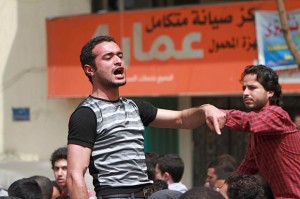
In this April 1, 2011 photo, activist Ahmed Douma chants slogans during a march to Tahrir Square demanding the prosecution of members of former President Hosni Mubarak’s government in Cairo, Egypt. AP
CAIRO — An Egyptian appeals court on Monday upheld convictions and three-year prison sentences passed against three of the country’s most prominent political activists.
The ruling is likely to draw swift condemnation from among Egypt’s liberal and secular pro-democracy campaigners opposed to the military-backed authorities’ targeting of dissent.
That targeting has been overshadowed by the much larger crackdown against the Muslim Brotherhood group and other Islamists, which has led to the death of hundreds and the jailing of at least 16,000 since the July ouster of President Mohammed Morsi.
The three activists — Ahmed Maher, Mohammed Adel and Ahmed Douma — were leading figures in Egypt’s 2011 popular uprising that toppled long-time autocrat Hosni Mubarak.
The three were accused of violating a controversial new law on holding street protests and were sentenced each to three years in prison in December.
The law imposes draconian restrictions on any public gathering, but the government says it is meant to bring order and stability to the streets in the face of months of continued protests by supporters of the Islamist Morsi.
The court also ruled on Monday that each of the three would be fined 50,000 Egyptian pounds (about $7,140).
“The judge, regretfully, has upheld the sentence on Douma, Maher and Adel. Down, down with the oppressive verdict,” one of their lawyers, Gamal Eid, wrote on his Twitter account, minutes after the ruling was read by presiding Judge Ahmed Faisal.
The three young activists were the founders of the April 6 movement, which was at the forefront of the 18-day uprising against Mubarak, but later joined the opposition against the generals who took over the reins of power for nearly 17 months after Mubarak’s ouster.
April 6 initially supported Morsi, Egypt’s first freely elected president, but soon became disillusioned with the Islamist leader’s perceived attempt at concentrating powers with his Brotherhood.
The movement supported Morsi’s removal by the military last July, after days of protests by millions of Egyptians against his rule.
But again, April 6 shifted its stance to denounce what it describes as the curtailment of freedoms and the heavy handedness of the police under the current military-backed government.
The predominantly pro-military media has cast the April 6 movement as a treasonous organization with foreign links.
RELATED STORIES
Clashes kill 29 as Egypt marks 2011 uprising
More than 120 hurt as Egypt activists, Islamists clash